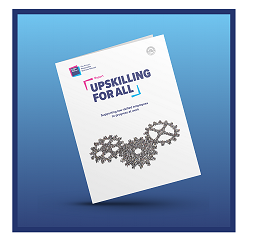Upskilling for All
This report, ‘Upskilling for All’, featuring short, innovative case studies from Business in the Community (BITC) members and produced in collaboration with Phoenix Group, the UK’s largest long-term savings and retirement business, calls on businesses to put in place the following three building blocks for effective upskilling:
- Implementing an effective data strategy so that they can identify where skills gaps lie.
- Ensuring that line managers are supported so that they can encourage and support their direct reports to develop.
- Create a culture of continuous learning across the business so employees are driven to engage with learning and development opportunities.

Why upskilling is a business essential
Creating meaningful employment is one of the most significant ways that businesses can support individuals to break out of poverty. A good job offers security, rights, a fair income and opportunities for personal development and progression. Yet, people from lower socio-economic backgrounds are far less likely to progress at work than their wealthier peers. For many low-income individuals, securing a job does not mean upward social mobility; but instead, remaining in a low-skill, low-pay cycle.
Survey key findings
The YouGov survey, on which this report Upskilling for All and its building blocks is based, returned the following key findings.
- 55% of lower-skilled workers are less likely to feel that their current job makes good use of their skills and abilities, compared to 76% of higher-skilled workers.
- Almost half of lower-skilled workers also reported knowing which skills they would need to progress in their careers, compared to seven in 10 higher-skilled workers.
- Nearly half (45%) of all lower-skilled workers are less likely to believe they have an equal opportunity to advance in their career regardless of their characteristics or circumstances compared to two-thirds of higher-skilled workers.
- One in 10 lower-skilled workers have undertaken any training or development activities in their current roles, compared to five in 10 higher-skilled workers.
Case studies featured in the report
Although not all of the case studies in this report are specifically focused on low-skilled employees, they all describe initiatives that can be extended or replicated to ensure those most in need of development are to benefit.
- Amey ensures its line managers make time for development conversations.
- Learners at Amey determine their career path.
- Boots encourages every colleague to take time out for learning.
- Business in the Community uses data to stay on track to meet organisational ambitions.
- Capita uses the language of Essential Skills to inform development.
- Coventry Building Society’s employees are encouraged to focus on the future.
- HS2 upskill managers at every level of their business.
- Ricoh assesses workforce skills to create opportunities for development
- Severn Trent Water identified skills gaps caused by an ageing workforce.
- Thames Water sells the individual benefits of training.

